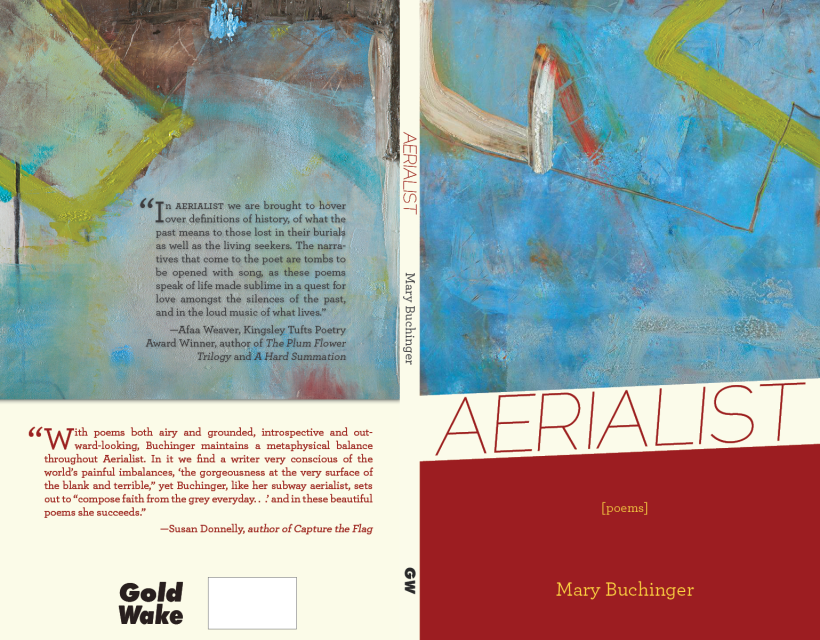Aerialist
SKU:
$14.00
$14.00
Unavailable
per item
Two of my favorite poems in Aerialist are “The First Foundation,” in which the poet-as-child hides under a barn “with all that weight above pinning me down,” and “Airborne,” in which her grandmother is swept into flight by a gust of wind. Buchinger maintains this metaphysical balance throughout the book, with poems both airy and grounded, introspective and outward-looking. In Aerialist we find a writer very conscious of the world’s painful balances, “the gorgeousness at the very surface of the blank and terrible,” yet Buchinger, like her subway aerialist, sets out to “compose faith from the grey everyday…” and in these beautiful poems she succeeds.
--Susan Donnelly, author of Capture the Flag
In Aerialist we are brought to hover over definitions of history, of what the past means to those lost in their burials as well as the living seekers. The narratives that come to the poet are tombs to be opened with song, as these poems speak of life made sublime in a quest for love amongst the silences of the past, and in the loud music of what lives.
—Afaa Weaver, Kingsley Tufts Poetry Award Winner, author of The Plum Flower Trilogy and A Hard Summation
A typical poem in Mary Buchinger’s wonderfully titled collection displays, like the Aerialist herself, the strength to maintain both motion and pinpoint grace and look good doing it. But the collection’s scope extends far beyond this, ranging from sturdy memory-intensive stories of farm life in the thumb of Michigan to impressions painted as with a single hair (the Proust poems) and from metaphysical speculations (“Redeem/the unread vision”) and queries (“The Latest Rapture”) to linguistic hijinks (“Call, Me, Ishmael”). Among many outstanding pieces are one entitled “We wander through the cemetery,” which reproduces an ambulatory recollection of a companion’s great-aunt, studded with small surprises set forth among the quiet features of the cemetery and ending on a note that lingers deliciously. Meanwhile the Aerialist rises from her seat on the subway and performs hanging from the hand-straps. In the concluding poem, a final delight (“On the River’s Edge”), geese in the river float on the water, feel the winter’s ice in the sky, and say, “We live in two places at once, /Hwaann! Hwaann! You too. You too.” This is an exciting and satisfying collection.
--Bob Brooks, author of Unguarded Crossing and Subverse
--Susan Donnelly, author of Capture the Flag
In Aerialist we are brought to hover over definitions of history, of what the past means to those lost in their burials as well as the living seekers. The narratives that come to the poet are tombs to be opened with song, as these poems speak of life made sublime in a quest for love amongst the silences of the past, and in the loud music of what lives.
—Afaa Weaver, Kingsley Tufts Poetry Award Winner, author of The Plum Flower Trilogy and A Hard Summation
A typical poem in Mary Buchinger’s wonderfully titled collection displays, like the Aerialist herself, the strength to maintain both motion and pinpoint grace and look good doing it. But the collection’s scope extends far beyond this, ranging from sturdy memory-intensive stories of farm life in the thumb of Michigan to impressions painted as with a single hair (the Proust poems) and from metaphysical speculations (“Redeem/the unread vision”) and queries (“The Latest Rapture”) to linguistic hijinks (“Call, Me, Ishmael”). Among many outstanding pieces are one entitled “We wander through the cemetery,” which reproduces an ambulatory recollection of a companion’s great-aunt, studded with small surprises set forth among the quiet features of the cemetery and ending on a note that lingers deliciously. Meanwhile the Aerialist rises from her seat on the subway and performs hanging from the hand-straps. In the concluding poem, a final delight (“On the River’s Edge”), geese in the river float on the water, feel the winter’s ice in the sky, and say, “We live in two places at once, /Hwaann! Hwaann! You too. You too.” This is an exciting and satisfying collection.
--Bob Brooks, author of Unguarded Crossing and Subverse
